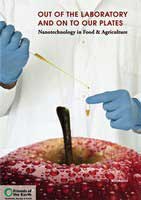Mar 11 2008
Food, packaging and agricultural products containing manufactured nanomaterials pose a toxic health risk and should be suspended from sale until new safety testing, laws and appropriate labelling are created, a new report says.
 Out of the laboratory and on to our plates: Nanotechnology in foods and agriculture
Out of the laboratory and on to our plates: Nanotechnology in foods and agriculture
The Friends of the Earth (FoE) report reveals Australians may be unwittingly ingesting nanomaterials that could be toxic because regulators are struggling to keep pace with their rapidly expanding use. The report found that 104 foods, food contact materials and agricultural products containing nanomaterials are now on sale internationally.
Nanotechnology, the manipulation of matter at the scale of atoms and molecules, is now used to manufacture some nutritional supplements, flavour and colour additives, food packaging, cling wrap, containers and chemicals used in agriculture. Industry analysts estimate several hundred nano food products are now on sale internationally.
“The use of nanomaterials by the food industry is very concerning,” said report co-author Dr Rye Senjen. “Early evidence indicates some nanomaterials used in foods and food packaging can be toxic.
“This is a big worry because Australian laws do not require manufacturers to declare whether or not their products contain manufactured nanomaterials, or to conduct new safety tests on nano ingredients.”
“Australian regulators have no way to know how many nano foods may be on Australian supermarket shelves and no way to check whether or not they are safe.”
Report co-author Georgia Miller said many of the world’s largest food companies, including Heinz, Nestle, Unilever and Kraft, were currently exploring nanotechnology for food processing and packaging.
“We know manufactured nanomaterials are already in some products found on Australian supermarket shelves and used in Australian kitchens,” Ms Miller said. “Packaging for Cadbury chocolates, antibacterial kitchen wipes and cleaning sprays, and refrigerators sold by Samsung, Hitachi and LG Electronics now contain manufactured nanomaterials.
“In the USA and Europe nano ingredients are found in some fruit juices, processed meats, diet milkshakes and baby food. It is possible unlabelled nano additives are also found in foods sold in Australia.
“We are calling for a halt to sales of all nano food, food packaging and agricultural chemicals until new laws are enacted to ensure their safety and until nano ingredients are labelled so people can choose whether or not they want to eat nano foods.”
Out of the laboratory and on to our plates: Nanotechnology in foods and agriculture was released internationally today in Europe, the USA and Australia.